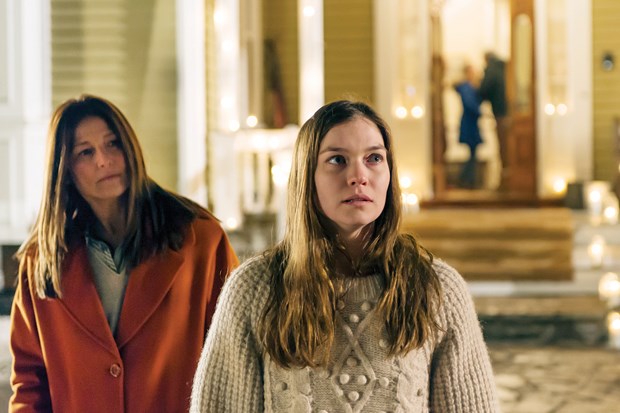Unless. Written and directed by Alan Gilsenan. Starring Catherine Keener and Hannah Gross. Rating: 7 (out of 10)
In Unless, a woman grapples with the sudden departure of her seemingly happy college-aged daughter, who is discovered on the streets of Toronto several weeks later, mute and virtually catatonic.
The Canada-Ireland co-production is directed by Alan Gilsenan and based on Pulitzer Prize-winning author Carol Shields’ final novel, which delves into issues of female exclusion with a much angrier tone on the page than is on display here in the film.
Instead, Catherine Keener gives a masterly, often daring performance as a mother moving through several stages of grief as she tries to solve the mystery of her daughter’s catastrophic transformation.
Reta (Keener) is translator for a successful feminist writer as well as an author in her own right, with one fairly successful novel to her credit. She lives comfortably with partner Tom (Matt Craven) and three teenaged daughters, a bustling, stimulating life. But the idyll is shattered when Reta receives a phone call that her eldest, Norah (Hannah Gross), has left university and is living on the streets.
A frenzied drive downtown confirms her fears: Norah is parked right outside the bright lights and nickel-and-dime kitsch of Honest Ed’s store. She does not speak, she does not ask passers-by for money: she simply sits all day holding a cardboard sign that reads “goodness”.
Reta and the family try everything: they plead and cry. They bring creature comforts and family friends by. Because Norah is over age 18 there is little that they can do. An ex-boyfriend and the director of a shelter where Norah sleeps each night yield precious little information. In the end, there is nothing for Reta to do but keep silent vigil with her daughter, waiting for the reason for Norah’s silent protest to be revealed.
Meanwhile, Norah faces some of the more predictable perils of life on the street, her face a silent mask of compressed suffering.
She and Tom’s rock-solid relationship shows cracks as he considers institutionalization (“we didn’t push her away, she did that all by herself!”) while Reta preaches patience. (She does, however, reach a breaking point and try to drag Norah into her waiting car, a tactic considered by every truthful parent in the audience.) And it isn’t long before Norah’s choice affects Reta’s life as a public figure: a tenacious reporter (Brendan Coyle) asks Reta a few soft-lob questions before getting to the heart of the matter, the issue of “the famous author and the homeless child.”
Two months and four days in, Reta is cathartically writing about that word, goodness, as she creates a new reality for her family. “Happiness isn’t goodness, I know that now,” she says.
It’s hard to maintain the energy of that initial dramatic premise, waiting as we are for the reason that Norah took to the streets. Credit goes to Gilsenan for paring down some of the weightier elements of
Shields’ prose in order to give vitality to a film that is essentially a mystery about a young woman sitting still; it’s a film that’ll move you, regardless.



